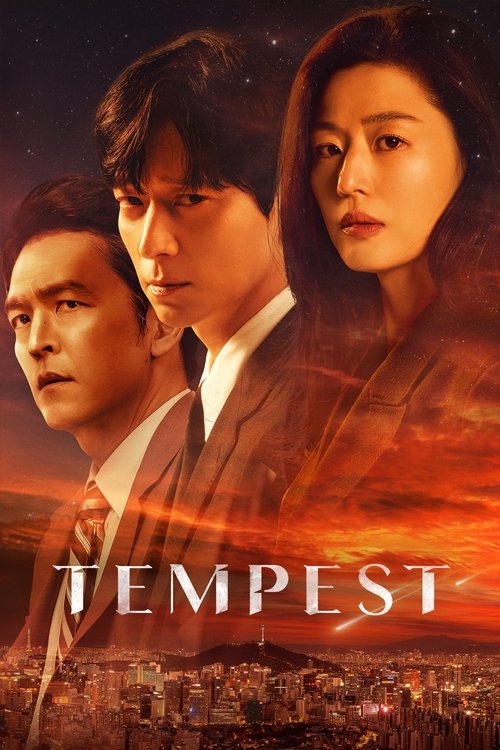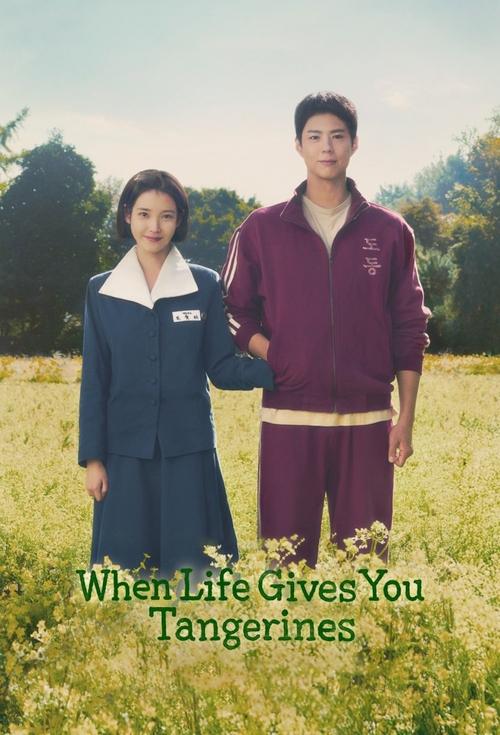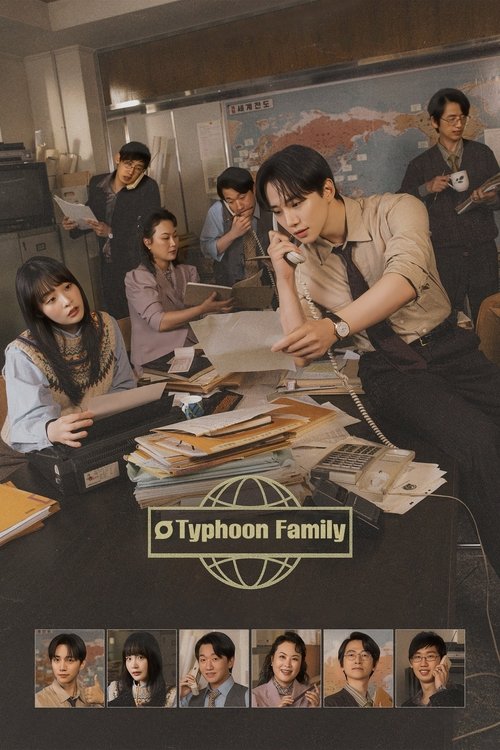
Ask Your Own Question
What is the plot?
The series begins with Seo Mun-ju, a former ambassador, investigating the suspicious murder of her husband, which occurs publicly during a presidential event. This event triggers her deeper involvement in uncovering a conspiracy that threatens the stability of the Korean peninsula. Early on, Mun-ju encounters Paik San-ho, a skilled secret agent and mercenary, who becomes her protector and ally. Their initial meeting is marked by small acts of kindness from San-ho, who is portrayed as a resourceful man without a country, adept at survival in hostile environments.
As Mun-ju digs deeper, she discovers that her husband's death is linked to a larger plot involving espionage and political manipulation. The tension escalates when it becomes clear that Ok-seon, Mun-ju's mother, is involved in a high-stakes plan to launch a nuclear missile against the United States from a submarine. Mun-ju's brother, Jun-sang, who has been gathering evidence against their mother, confronts her to stop the attack. A firefight ensues between Jun-sang, Mun-ju, and Ok-seon aboard the submarine.
During the confrontation, Jun-sang is shot and injured but stays behind to hold off Ok-seon, allowing Mun-ju to escape to a second control room. Mun-ju uses a phone there to contact Kim Han-sang, the fictional ruler of North Korea, to persuade him to order the submarine to turn back. Kim agrees to redirect the submarine, but warns that Ok-seon still retains the ability to launch the missile independently.
Meanwhile, Ok-seon initiates the missile launch sequence. Mun-ju and San-ho confront her, but Ok-seon throws the key that could abort the launch into the water and then shoots herself, effectively ending the immediate threat. The Korean coast guard and military respond to the crisis, with San-ho committed to protecting Mun-ju until the end.
Throughout the series, the political backdrop is one of escalating conflict between the US and North Korea, with the Korean peninsula caught in the middle. The narrative explores themes of loyalty, betrayal, and the personal costs of political power struggles, with Mun-ju and San-ho navigating a dangerous landscape of espionage and war threats. The story unfolds with detailed sequences of investigation, confrontations, and strategic decisions that drive the plot toward its climactic resolution on the submarine.
What is the ending?
The TV show Tempest (2025) ends with Mun-ju announcing her candidacy for President of South Korea, while San-ho stays behind to defuse a bomb on a ship carrying nuclear material. The bomb explodes, and San-ho's fate is left ambiguous, though a final scene suggests he may have survived. Mun-ju moves forward with her political career, cleared of suspicion, and the story closes with open possibilities for the future.
The ending of Tempest unfolds in a tense, dramatic sequence that highlights the culmination of the characters' struggles and the unresolved geopolitical tensions.
The final scenes begin with Mun-ju and San-ho discovering bombs containing C4 explosives planted on a ship transporting nuclear material. The stakes are immense, as the detonation would cause catastrophic consequences for millions. Mun-ju is quickly evacuated by rescue teams to safety, while San-ho chooses to stay behind to try to defuse the bomb, demonstrating his self-sacrificial nature and deep care for Mun-ju's safety.
As Mun-ju is taken away, she reflects on the journey and the revelations about Jun-ik's death, which have cleared her name and exposed the conspiracies behind the attack. San-ho's priority is Mun-ju's survival, even at the cost of his own life. The bomb detonates, and San-ho disappears in the explosion, leaving his fate uncertain.
The show then presents a poignant, ambiguous scene where San-ho is seen burying Mun-ju's necklace in the sand in a remote desert. This moment is open to interpretation--it could be a dream sequence or a hint that San-ho survived the blast. The series deliberately leaves this unresolved, allowing viewers to imagine a future reunion or continuation of their story.
Meanwhile, Mun-ju announces her candidacy for the presidency of South Korea, signaling her determination to change the political landscape and address the systemic issues that led to the crisis. This marks a new chapter for her character, moving from a diplomat caught in espionage and tragedy to a leader seeking reform.
The fates of the main characters at the end are:
- Mun-ju: Alive, politically empowered, and running for president, symbolizing hope and resilience.
- San-ho: Presumed dead by many but with an ambiguous fate, leaving open the possibility of survival and future involvement.
- Jun-ik: His death and the truth behind it have been uncovered, resolving a key mystery.
- Other characters involved in the conspiracy or geopolitical tensions remain in the background, as the larger systemic issues persist beyond the personal stories.
The ending is structured to emphasize sacrifice, unresolved tension, and the potential for renewal, with a focus on Mun-ju's growth and San-ho's devotion. The narrative closes on a note that balances closure with openness, reflecting the complex realities of political intrigue and personal loyalty.
Is there a post-credit scene?
Based on available sources, the 2025 K-drama Tempest does not have a traditional post-credits scene in the sense of a Marvel-style teaser or sequel setup. However, the finale does include a significant, emotionally charged sequence that plays after the main narrative climax--a scene that functions similarly to a post-credits moment in its placement and ambiguity.
After the explosive climax on the ship, where Paik Sanho stays behind to attempt to defuse a bomb while Munju is rescued to safety, the story cuts to black as the bomb detonates. Sanho's fate is left uncertain; he is not seen in the immediate aftermath, and the narrative strongly implies he may have perished in the blast. Munju, now safe but emotionally shattered, must carry on without knowing whether the man who became her "Polar Star" has survived.
The final scene--effectively the show's "post-credits" moment--shows a lone figure in a vast, sun-scorched desert. The camera lingers on his hands as he carefully buries Munju's necklace in the sand. The visual is stark: golden light, endless dunes, and a profound silence. The man's face is not immediately shown, but the emotional weight of the gesture is unmistakable--this is an act of mourning, memory, and perhaps hope. The show's frequent use of dream sequences leaves the reality of this moment deliberately ambiguous. Is this Sanho, miraculously alive and honoring Munju from afar? Or is it a symbolic farewell, a dream or vision expressing Munju's unresolved grief and longing?
The scene is charged with melancholy and possibility. If interpreted literally, it suggests Sanho survived the explosion and is now living in self-imposed exile, unable or unwilling to return to Munju, yet still bound to her by love and memory. If read as a dream, it reflects Munju's inner world--her inability to let go, her hope against hope for reunion. The show's creator has stated that Sanho's fate was intentionally left open, both to honor the emotional investment of the audience and to preserve the possibility of his return in Munju's future.
In summary: Tempest (2025) does not have a conventional post-credits scene, but it concludes with a visually and emotionally potent sequence that revisits Sanho's fate. This scene--whether real or imagined--serves as the narrative's final punctuation, leaving viewers with a haunting blend of loss, love, and the fragile hope of reunion.
What is the role of Mun-ju in the series and how does she interact with San-ho?
Mun-ju, played by Jun Ji-hyun, is a skilled diplomat who served as the UN ambassador. She embarks on a mission with San-ho, an international special agent, to uncover the truth behind a deadly attack threatening the Korean Peninsula. Their interaction is crucial as they work together to solve the mystery, with San-ho providing protection and support to Mun-ju throughout their dangerous journey.
Who is Ok-seon and what is her significance in the plot?
Ok-seon is a pivotal character in the series, involved in espionage and responsible for initiating a sequence to launch a nuclear attack. Her actions are driven by her role in the plot, leading to a confrontation with Mun-ju and San-ho. Ok-seon's character adds tension and urgency to the storyline as her decisions have significant consequences for the characters and the plot's progression.
What is the relationship between Jun-sang and his mother, Ok-seon?
Jun-sang is deeply conflicted about his mother's actions. Despite his love for his brother, he is shocked by Ok-seon's involvement in espionage and her plans. This leads him to gather evidence against her and attempt to prosecute her. His emotional turmoil is evident as he tries to reconcile his family ties with his duty to stop her dangerous actions.
How does San-ho's background influence his actions in the series?
San-ho, or Mr. Paik, is portrayed as a man without a country, which makes him incredibly resourceful and skilled in survival tactics. His mysterious nationality and mercenary background contribute to his ability to navigate complex situations. His feelings for Mun-ju are not explicitly romantic but rather inspirational, driving him to protect her throughout their mission.
What role does Kim Han-sang play in the story, and how does Mun-ju interact with him?
Kim Han-sang is the ruler of North Korea in the series. Mun-ju contacts him in a critical moment to convince him to turn a submarine around, which is crucial to preventing a catastrophic attack. She informs him that the payment for the submarine has been frozen and warns that if the attack proceeds, both North Korea and Idisha will face severe retaliation. This interaction is pivotal as it leads to a decision that impacts the plot's outcome.
Is this family friendly?
Tempest (2025) is not considered family-friendly and is best suited for older teens and adults due to its mature themes and intense content. While the series is a gripping political thriller with complex characters and high-stakes intrigue, several aspects may be upsetting or inappropriate for children or sensitive viewers.
Potentially Objectionable or Upsetting Content
Violence and Gore - The series opens with a graphic assassination: a South Korean politician is shot in the neck, and the scene is depicted with enough realism to be deeply unsettling. Blood and the immediate aftermath are shown, which could be distressing. - There is a depiction of a mass shooting later in the series, portrayed with intensity and some visual detail that may be hard for sensitive viewers to watch. - Other scenes include covert operations, physical confrontations, and moments of peril where characters are in life-threatening situations, all rendered with a sense of urgency and realism.
Frightening and Intense Scenes - The overall tone is tense and suspenseful, with a constant undercurrent of danger as political conspiracies unfold. The threat of war, nuclear escalation, and betrayal creates a pervasive sense of anxiety. - Characters frequently face moral dilemmas, emotional turmoil, and the pressure of impossible choices, which may be emotionally heavy for younger viewers. - The series does not shy away from showing the psychological impact of violence and loss on its characters, including grief, fear, and paranoia.
Sex and Nudity - While not a focus, there is moderate sexual content, which may include suggestive scenes or references, though not explicit nudity. - Romantic subplots and tensions are present, sometimes intertwined with the main political drama.
Language and Substance Use - Profanity is present but generally mild. - Occasional scenes depict alcohol consumption and smoking, though these are not central to the plot.
Themes - The show explores dark themes such as betrayal, espionage, family dysfunction, and the moral cost of power. - Religious and existential questions are raised, adding to the emotional and intellectual weight of the narrative.
Summary
Tempest (2025) is a sophisticated, adult-oriented thriller with a high level of suspense, violence, and emotional intensity. It is not recommended for children or those sensitive to graphic violence, intense suspense, or mature themes. Parents and guardians should consider the series' content ratings and the specific sensitivities of their household before viewing.































